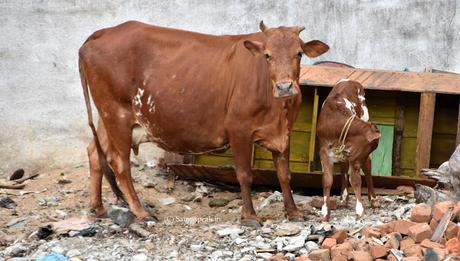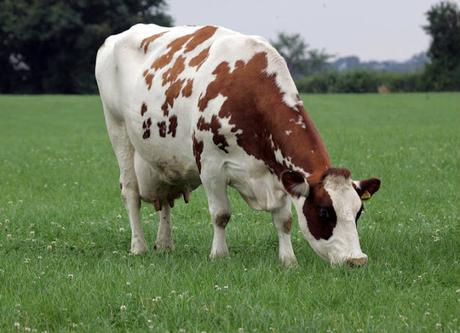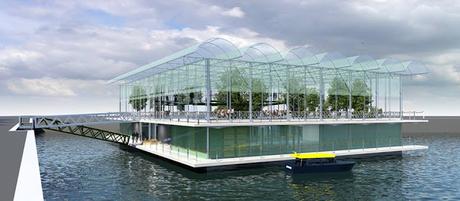We design and create iconic, innovative, sustainable buildings and landscapes on the water. Have a look at our projects and feel free to reach out to us with ideas.~ following some links I was led to the website of Bealadon BV – which is a property developer in Nederland - sure have no reason for reading about property development in the Netherlands ! it further read - our engineering and design principals are in line with nature’s biggest challenges concerning Energy, Food, Water & Waste.
 Back
home at Thiruvallikkeni – much is written about the cattle menace – that of
roaming cows in the mada veethis putting fear into humans and harming them too –
for sure, Triplicanites are not against the holy cows – we have seen hundreds
of them (owned by couple of individuals too) – those days in the morning &
evening, the owners would bring the cows / buffaloes to the door steps, show
the jorthalai to give confidence that there is no water inside, milk the cow in
front and sell milk. Those days, the cattle were so well maintained. Gone are
those days - the population of cattle has come down to less than hundred and
those owning too have migrated to greener pastures. There are scenes of
untethered cattle roaming, looking out for food, sometimes causing trouble by
chasing humans – and sadly, one could see on road, the cattle being crudely
given hormonal injections for giving milk.. .. ..
Population across
the globe is growing. This growth will
take place in the big (delta) cities, creating great pressure on the demand for
food, water and energy, and consequently on dwellings as well. Where will we be
able to live safely, cleanly that is also a healthy environment? Producing food is a growing challenge to a
world population that is growing intensively and becoming increasingly
prosperous. After all, there is less and less suitable agricultural land to
produce food. The cities of the world are expanding to meet the demand for
housing, so that the citizen literally gets further and further away from
agriculture.
I read
about Bealadon BV and an interesting plan called ‘floating farm’ to produce
fresh milk ! though they claim to produce fresh products, do research and
education on cattle – it would be more of commercial of exploiting cow and
earning revenue, yet the idea of keeping cows on a transparent farm on water,
does look novel and interesting.
In developed
countries, cattle are reared in large numbers in dairy farms – mostly mechanized
producing huge quantities of milk, out of which dairy products are made and
sold. Dairy cows generally are of the
species Bos taurus. BBC reports that the world's first offshore dairy farm opens in the
Port of Rotterdam this year, with the aim of helping the city produce more of
its own food sustainably. But will such farms ever be able to produce enough to
feed the world's growing urban populations? A Dutch property company, Beladon,
is launching the world's first "floating farm" in a city port. It has
built the offshore facility right in the middle of Rotterdam's Merwehaven
harbour and will use it to farm 40 Meuse-Rhine-Issel cows milked by robots.
Back
home at Thiruvallikkeni – much is written about the cattle menace – that of
roaming cows in the mada veethis putting fear into humans and harming them too –
for sure, Triplicanites are not against the holy cows – we have seen hundreds
of them (owned by couple of individuals too) – those days in the morning &
evening, the owners would bring the cows / buffaloes to the door steps, show
the jorthalai to give confidence that there is no water inside, milk the cow in
front and sell milk. Those days, the cattle were so well maintained. Gone are
those days - the population of cattle has come down to less than hundred and
those owning too have migrated to greener pastures. There are scenes of
untethered cattle roaming, looking out for food, sometimes causing trouble by
chasing humans – and sadly, one could see on road, the cattle being crudely
given hormonal injections for giving milk.. .. ..
Population across
the globe is growing. This growth will
take place in the big (delta) cities, creating great pressure on the demand for
food, water and energy, and consequently on dwellings as well. Where will we be
able to live safely, cleanly that is also a healthy environment? Producing food is a growing challenge to a
world population that is growing intensively and becoming increasingly
prosperous. After all, there is less and less suitable agricultural land to
produce food. The cities of the world are expanding to meet the demand for
housing, so that the citizen literally gets further and further away from
agriculture.
I read
about Bealadon BV and an interesting plan called ‘floating farm’ to produce
fresh milk ! though they claim to produce fresh products, do research and
education on cattle – it would be more of commercial of exploiting cow and
earning revenue, yet the idea of keeping cows on a transparent farm on water,
does look novel and interesting.
In developed
countries, cattle are reared in large numbers in dairy farms – mostly mechanized
producing huge quantities of milk, out of which dairy products are made and
sold. Dairy cows generally are of the
species Bos taurus. BBC reports that the world's first offshore dairy farm opens in the
Port of Rotterdam this year, with the aim of helping the city produce more of
its own food sustainably. But will such farms ever be able to produce enough to
feed the world's growing urban populations? A Dutch property company, Beladon,
is launching the world's first "floating farm" in a city port. It has
built the offshore facility right in the middle of Rotterdam's Merwehaven
harbour and will use it to farm 40 Meuse-Rhine-Issel cows milked by robots.
 Meuse
rhine issel cow – pic credit : www.dairydreams.co.uk
Built-up urban
areas may not seem like the most sensible places to run farms, but reducing the
distance food travels before it reaches consumers' plates makes environmental
sense as it reduces transport pollution. And if the global population grows to
9.8 billion by 2050 as expected, 70% are forecast to live in cities - up from
55% today. Beladon's farm, which is on three levels and is anchored to the
ocean floor, is expected to open at the end of 2018 and produce about 800
litres of milk a day. The concept would be resilient against hurricanes, too, it
is stated. Over the last few years, the
farm’s concept has taken shape, and
earlier this summer its floating platform was moved by barge from Zaandam in
the north of Holland, to Rotterdam.
Peter's wife and
business partner, Minke van Wingerden, says the farm will start with 40 cows,
enough for the venture to break even. But she says it is "easily
scalable", with larger operations promising "obvious
efficiencies". The farm also aims to reuse and recycle as much as it can. "At
least 80% of what our cows eat will be waste products from Rotterdam's food
industry," says the farm's general manager, Albert Boersen. That might
include grains discarded by local breweries, leftovers from restaurants and
cafes, by-products from local wheat mills, and even grass clippings, all
collected and delivered in electric trucks provided by local "green
waste" firm GroenCollect. "We will grow duckweed as an animal feed,
too," says Ms van Wingerden. "It is high in protein, fast-growing and
can be nurtured with cow urine. We will have an installation of four or five
vertical platforms growing the plant under special LED lights."
Meuse
rhine issel cow – pic credit : www.dairydreams.co.uk
Built-up urban
areas may not seem like the most sensible places to run farms, but reducing the
distance food travels before it reaches consumers' plates makes environmental
sense as it reduces transport pollution. And if the global population grows to
9.8 billion by 2050 as expected, 70% are forecast to live in cities - up from
55% today. Beladon's farm, which is on three levels and is anchored to the
ocean floor, is expected to open at the end of 2018 and produce about 800
litres of milk a day. The concept would be resilient against hurricanes, too, it
is stated. Over the last few years, the
farm’s concept has taken shape, and
earlier this summer its floating platform was moved by barge from Zaandam in
the north of Holland, to Rotterdam.
Peter's wife and
business partner, Minke van Wingerden, says the farm will start with 40 cows,
enough for the venture to break even. But she says it is "easily
scalable", with larger operations promising "obvious
efficiencies". The farm also aims to reuse and recycle as much as it can. "At
least 80% of what our cows eat will be waste products from Rotterdam's food
industry," says the farm's general manager, Albert Boersen. That might
include grains discarded by local breweries, leftovers from restaurants and
cafes, by-products from local wheat mills, and even grass clippings, all
collected and delivered in electric trucks provided by local "green
waste" firm GroenCollect. "We will grow duckweed as an animal feed,
too," says Ms van Wingerden. "It is high in protein, fast-growing and
can be nurtured with cow urine. We will have an installation of four or five
vertical platforms growing the plant under special LED lights."
 The project will
even generate some of its own energy - hydrogen produced through electrolysis
powered by solar panels. Once up and running, the farm will produce and
pasteurise milk and yoghurt on-site and sell it in Rotterdam. It will also
process and sell its own cow manure.
"Healthy,
sufficient food production is key to a better, cleaner, safer world." ~
but often mankind’s greed ensures that it is not the quality or sustenance of
animals but only the sustainability of the product and the financials that
overweigh everything else – be it local Thiruvallikkeni or any other part of
the globe.
With regards – S.
Sampathkumar
18th Aug
2018.
The project will
even generate some of its own energy - hydrogen produced through electrolysis
powered by solar panels. Once up and running, the farm will produce and
pasteurise milk and yoghurt on-site and sell it in Rotterdam. It will also
process and sell its own cow manure.
"Healthy,
sufficient food production is key to a better, cleaner, safer world." ~
but often mankind’s greed ensures that it is not the quality or sustenance of
animals but only the sustainability of the product and the financials that
overweigh everything else – be it local Thiruvallikkeni or any other part of
the globe.
With regards – S.
Sampathkumar
18th Aug
2018.

